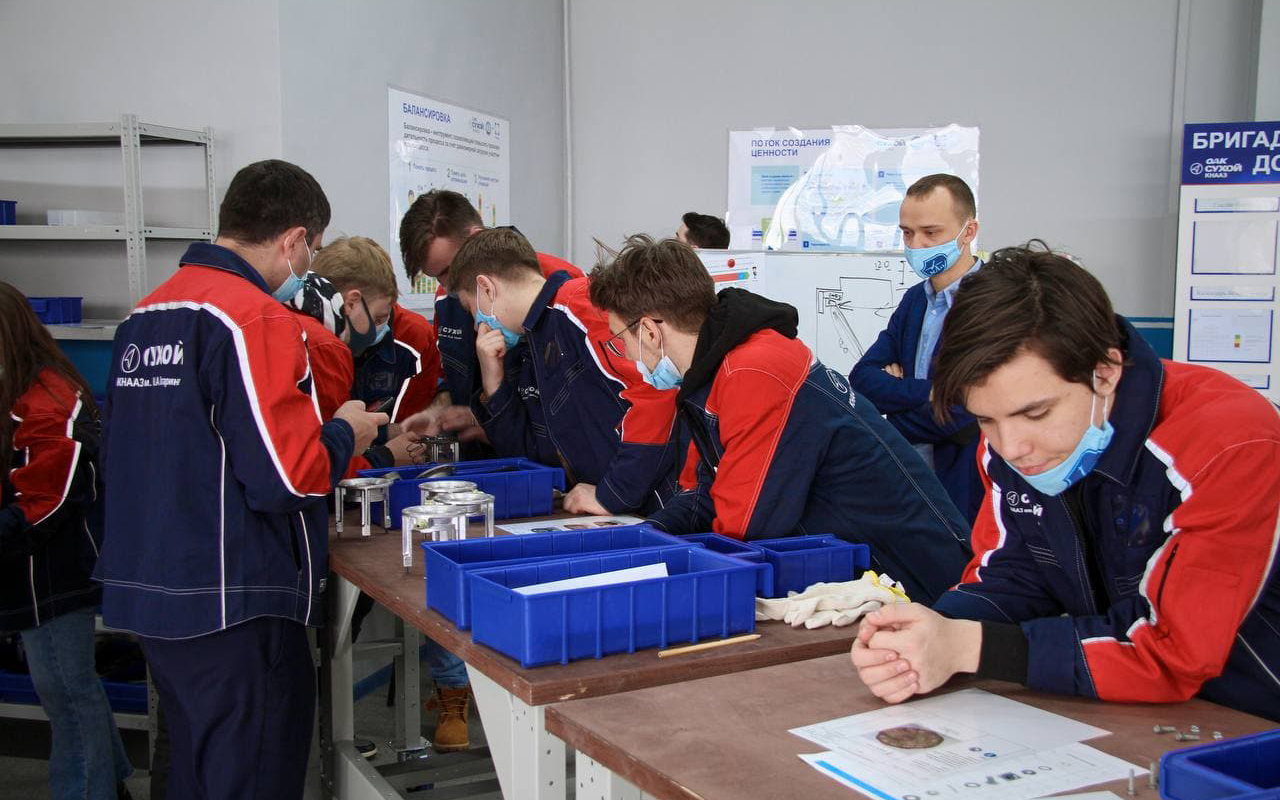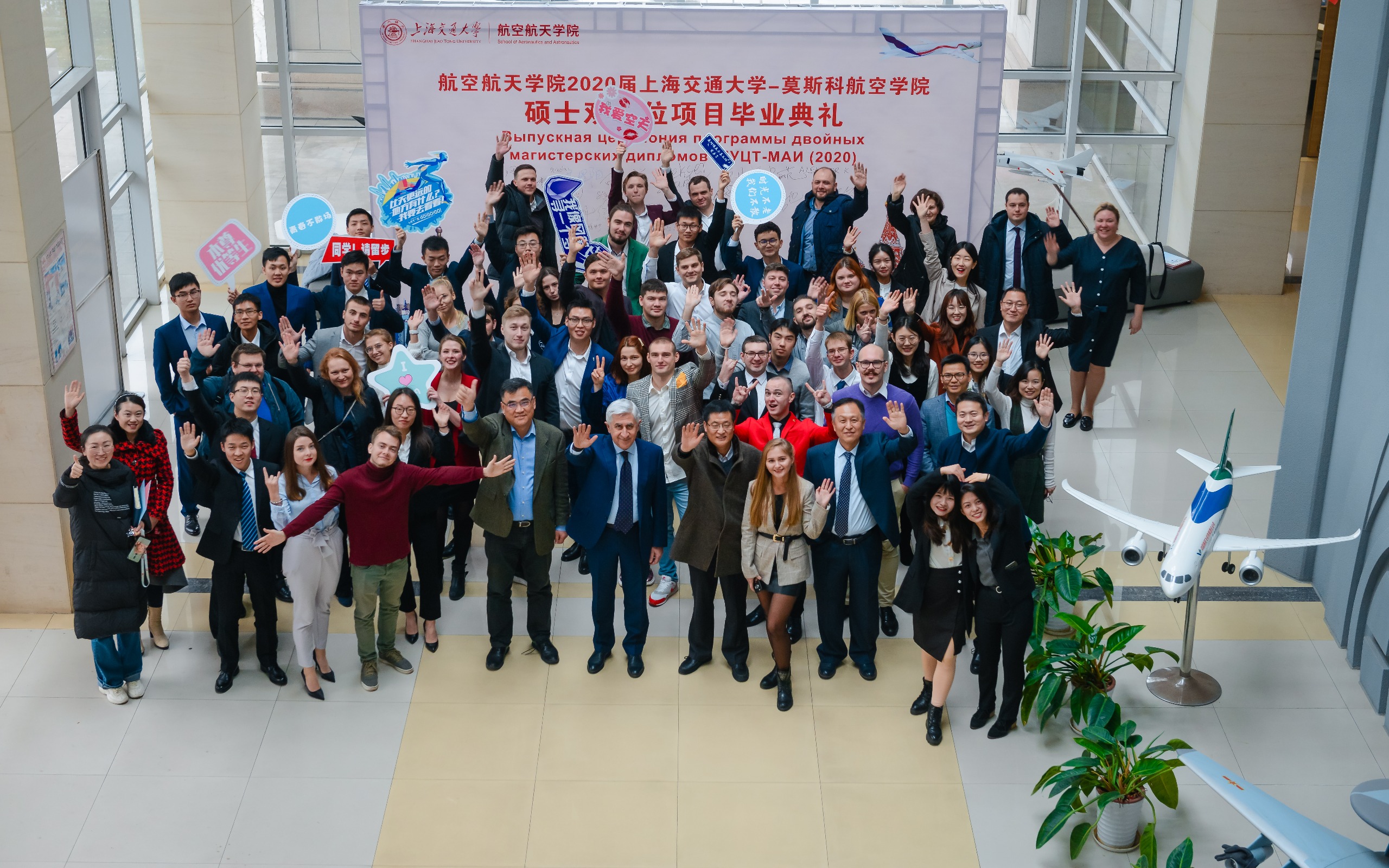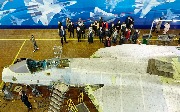MAI-SJTU Institute: Heading up for the anniversary intake
 The joint institute's programme is formed thanks to close contact with the clients like UAC, UEC, Holding Company "Technodinamika" on the Russian side; COMAC and AEEC on the Chinese side."This program is a huge step forward for MAI and an opportunity to shape the industry of the future. We are not learning from the industry, but we ourselves are setting the vector of development through our staff," comments Oleg Dolgov.These statements are confirmed by the interest of the students in the project."The international education programme is first and foremost a quality indicator for the university," says Veronika Monakhova, director of the directorate of Institute No. 2 Aviation, Rocket Engines and Power Plants. "Our students enter the master's degree programme even after specialisation. For a student, MAI-SJTU is not just another level of education, but a promising opportunity to find a unique educational trajectory", she adds.
The joint institute's programme is formed thanks to close contact with the clients like UAC, UEC, Holding Company "Technodinamika" on the Russian side; COMAC and AEEC on the Chinese side."This program is a huge step forward for MAI and an opportunity to shape the industry of the future. We are not learning from the industry, but we ourselves are setting the vector of development through our staff," comments Oleg Dolgov.These statements are confirmed by the interest of the students in the project."The international education programme is first and foremost a quality indicator for the university," says Veronika Monakhova, director of the directorate of Institute No. 2 Aviation, Rocket Engines and Power Plants. "Our students enter the master's degree programme even after specialisation. For a student, MAI-SJTU is not just another level of education, but a promising opportunity to find a unique educational trajectory", she adds. Indeed, the MAI-SJTU joint institute is unique primarily because of its innovative educational process. This is confirmed by Ilya Konstantinov, a graduate of the first intake of MAI-SJTU programme, currently working as a supervisor of English-language educational programmes at Institute No.1."Just like any international programme, MAI-SJTU is several steps ahead of the conventional ones, even though it is curriculum-wise quite conservative and stable", says Ilya. "MAI-SJTU foresees a regular exchange between the industry and the university. We are constantly in touch with the industry leaders for the international CR929 project. Such communication eliminates the risk of any discrepancy between the university's expertise and the industry's real-world challenges.OrganisationThe uniqueness of the MAI-SHUTS project sets a certain level of complexity in its implementation. First and foremost is the formal side of the issue, which requires the diligent work of the MAI's legal department."This project is unique also from the legal point of view, because of the creation of a joint institute, unifiсation of the individual plans, creation of a fully commercially-oriented education", says Maxim Vasiliev, Head of the Legal Department of MAI, "this is a big step for the development of external relations of MAI."MAI-SHUTS is the first joint institute at MAI and a result of cooperation between China and Russia, the two major universities and corporations of these countries. This level of cooperation influences many processes, both in MAI Institutes No.1 and No.2, where training is conducted, and in MAI University as a whole. First and foremost, such programs provide a widespread introduction of the English language.
Indeed, the MAI-SJTU joint institute is unique primarily because of its innovative educational process. This is confirmed by Ilya Konstantinov, a graduate of the first intake of MAI-SJTU programme, currently working as a supervisor of English-language educational programmes at Institute No.1."Just like any international programme, MAI-SJTU is several steps ahead of the conventional ones, even though it is curriculum-wise quite conservative and stable", says Ilya. "MAI-SJTU foresees a regular exchange between the industry and the university. We are constantly in touch with the industry leaders for the international CR929 project. Such communication eliminates the risk of any discrepancy between the university's expertise and the industry's real-world challenges.OrganisationThe uniqueness of the MAI-SHUTS project sets a certain level of complexity in its implementation. First and foremost is the formal side of the issue, which requires the diligent work of the MAI's legal department."This project is unique also from the legal point of view, because of the creation of a joint institute, unifiсation of the individual plans, creation of a fully commercially-oriented education", says Maxim Vasiliev, Head of the Legal Department of MAI, "this is a big step for the development of external relations of MAI."MAI-SHUTS is the first joint institute at MAI and a result of cooperation between China and Russia, the two major universities and corporations of these countries. This level of cooperation influences many processes, both in MAI Institutes No.1 and No.2, where training is conducted, and in MAI University as a whole. First and foremost, such programs provide a widespread introduction of the English language. Oleg Dolgov talks about the progress in the creation of an English-speaking institute:"We are constantly refreshing the curriculum, courses and teachers' competencies. We have created an English club for students, where a lively language environment has been formed. Both international students and students from Institute No. 10 "Foreign Languages", i.e. linguists who speak both Chinese and English, participate in the meetings. In addition, we have diversified the English programme in order to distribute the students most effectively according to their current level and to give them knowledge adapted to their level.Institute No. 2, which hosts the MAI-SJTU training, is also actively involved in creating an English-language environment. Thus, according to Veronika Monakhova, a lot of work has been done with the teaching staff."The Institute No. 2 had no experience of programmes of this complexity before," Veronika says. "A lot of work has been done since 2017, starting with the first intake for the master's programme: many teachers have undergone refresher courses and additional training. Today, our institute has already published research papers and textbooks in English".All the work related to MAI-SJTU runs at the Departments 101 "Design and certification of aircraft equipment," 203 "Construction and design of engines," 204 "Aerospace heat engineering" and 205 "Aircraft engine technology," but the changes that occur in one department, one way or another, affect others."MAI-SJTU is part of a big change," believes Ilya Konstantinov. "The international programmes seriously change the infrastructure of the educational process. Dense work with one educational area involves related institutions as well. When we expand our sphere of influence, new integrations with other universities or corporations are created."Such changes are particularly evident in the Individual Educational Pathways project. This project has been actively developed precisely on the basis of Institute No. 1.The "Trajectory 1" project-based learning programme for first- and second-year students, which is offered at the MAI Institute No. 1, has been built around the MAI-SJTU programme. The students interact with mentors and deal with the topics directly related to project work. An individual learning trajectory is formed, and the students themselves can influence it. They can take part in the work of the laboratory, obtain a second higher education simultaneously with the first one, and learn English, which together lead to a double diploma programme," explains Oleg Dolgov.Scientific activitiesA particular achievement for MAI during the years of the joint institute is the organization of a major international conference ICASSE (International Conference on Aerospace System Science and Engineering)."If there were no MAI-SJTU, there would be no conference. It was conceived as a new platform for scientific communication," highlights Dmitry Strelets, the Head of the research department of Department 101, who is chairman of the organizing committee and a member of the international steering committee of the conference.
Oleg Dolgov talks about the progress in the creation of an English-speaking institute:"We are constantly refreshing the curriculum, courses and teachers' competencies. We have created an English club for students, where a lively language environment has been formed. Both international students and students from Institute No. 10 "Foreign Languages", i.e. linguists who speak both Chinese and English, participate in the meetings. In addition, we have diversified the English programme in order to distribute the students most effectively according to their current level and to give them knowledge adapted to their level.Institute No. 2, which hosts the MAI-SJTU training, is also actively involved in creating an English-language environment. Thus, according to Veronika Monakhova, a lot of work has been done with the teaching staff."The Institute No. 2 had no experience of programmes of this complexity before," Veronika says. "A lot of work has been done since 2017, starting with the first intake for the master's programme: many teachers have undergone refresher courses and additional training. Today, our institute has already published research papers and textbooks in English".All the work related to MAI-SJTU runs at the Departments 101 "Design and certification of aircraft equipment," 203 "Construction and design of engines," 204 "Aerospace heat engineering" and 205 "Aircraft engine technology," but the changes that occur in one department, one way or another, affect others."MAI-SJTU is part of a big change," believes Ilya Konstantinov. "The international programmes seriously change the infrastructure of the educational process. Dense work with one educational area involves related institutions as well. When we expand our sphere of influence, new integrations with other universities or corporations are created."Such changes are particularly evident in the Individual Educational Pathways project. This project has been actively developed precisely on the basis of Institute No. 1.The "Trajectory 1" project-based learning programme for first- and second-year students, which is offered at the MAI Institute No. 1, has been built around the MAI-SJTU programme. The students interact with mentors and deal with the topics directly related to project work. An individual learning trajectory is formed, and the students themselves can influence it. They can take part in the work of the laboratory, obtain a second higher education simultaneously with the first one, and learn English, which together lead to a double diploma programme," explains Oleg Dolgov.Scientific activitiesA particular achievement for MAI during the years of the joint institute is the organization of a major international conference ICASSE (International Conference on Aerospace System Science and Engineering)."If there were no MAI-SJTU, there would be no conference. It was conceived as a new platform for scientific communication," highlights Dmitry Strelets, the Head of the research department of Department 101, who is chairman of the organizing committee and a member of the international steering committee of the conference. The conference takes place in different parts of the world: in Shanghai at SHCCT, in Moscow at MAI, in Toronto at the University of Toronto Aerospace School. The best papers from the conference are published in the Aerospace Systems Journal (Springer), which is indexed in the largest scientific database - Scopus. This year will be the fifth ICASSE meeting for scientists, students and industry."ICASSE is an opportunity to expand the platform for communication between scientists and undergraduates who are just becoming scientists. It is very important that they rotate in such an environment where current issues related to scientific fields can be discussed. Science cannot live in isolation - there must be an environment that allows for the exchange of thoughts, ideas and the results of their scientific discoveries. This conference for the Moscow Aviation Institute has become such an international level environment, in many respects thanks to the MAI-SJTU cooperation," says Dmitry Strelets.Multicultural spacePerhaps one of the most attractive factors for a student entering an international programme is the opportunity to experience another culture. This is also true of the MAI-SJTU joint institute. A year and a half in the world's largest metropolis, a university whose educational process is different from what you are used to, changes your worldview.Every joint MAI-SJTU student while in China learns how to build communication with people with a completely different mentality. The same applies to Chinese students who come to Moscow for a year, to the MAI. At the same time, every Maoist, as a representative of the host country, becomes a participant in this communication process. MAI-SJTU students, according to the MAI Office of International Activities, account for a third of all students from China within the university walls."The international programme blurs such boundaries as 'my institute', 'my city, 'my country'," says Ilya Konstantinov. "We have our university. Our joint institute. Not one city, but two cities, not one country, but two countries. Not one enterprise-employer, but the cooperation of enterprises that take part in this project. This blurring of boundaries is very interesting and very promising for the entire MAI."
The conference takes place in different parts of the world: in Shanghai at SHCCT, in Moscow at MAI, in Toronto at the University of Toronto Aerospace School. The best papers from the conference are published in the Aerospace Systems Journal (Springer), which is indexed in the largest scientific database - Scopus. This year will be the fifth ICASSE meeting for scientists, students and industry."ICASSE is an opportunity to expand the platform for communication between scientists and undergraduates who are just becoming scientists. It is very important that they rotate in such an environment where current issues related to scientific fields can be discussed. Science cannot live in isolation - there must be an environment that allows for the exchange of thoughts, ideas and the results of their scientific discoveries. This conference for the Moscow Aviation Institute has become such an international level environment, in many respects thanks to the MAI-SJTU cooperation," says Dmitry Strelets.Multicultural spacePerhaps one of the most attractive factors for a student entering an international programme is the opportunity to experience another culture. This is also true of the MAI-SJTU joint institute. A year and a half in the world's largest metropolis, a university whose educational process is different from what you are used to, changes your worldview.Every joint MAI-SJTU student while in China learns how to build communication with people with a completely different mentality. The same applies to Chinese students who come to Moscow for a year, to the MAI. At the same time, every Maoist, as a representative of the host country, becomes a participant in this communication process. MAI-SJTU students, according to the MAI Office of International Activities, account for a third of all students from China within the university walls."The international programme blurs such boundaries as 'my institute', 'my city, 'my country'," says Ilya Konstantinov. "We have our university. Our joint institute. Not one city, but two cities, not one country, but two countries. Not one enterprise-employer, but the cooperation of enterprises that take part in this project. This blurring of boundaries is very interesting and very promising for the entire MAI." The significance for the universityInternational programmes are often an important stimulus for the development of a university. And international programmes based on a high-tech transnational project are an even greater incentive.The MAI-SJTU is a complex, multi-stage, resource-intensive endeavour. However, its success implies the emergence of a generation of highly skilled aeronautical engineers who are capable of setting the development vector for an entire industry at the international level."The lifespan of knowledge in aviation today is four to five years," says Oleg Dolgov. "Participation in training programmes that are based on real-world projects provides access to up-to-date knowledge. MAI-SJTU graduates are versatile, communicative, knowledgeable and in-demand specialists."
The significance for the universityInternational programmes are often an important stimulus for the development of a university. And international programmes based on a high-tech transnational project are an even greater incentive.The MAI-SJTU is a complex, multi-stage, resource-intensive endeavour. However, its success implies the emergence of a generation of highly skilled aeronautical engineers who are capable of setting the development vector for an entire industry at the international level."The lifespan of knowledge in aviation today is four to five years," says Oleg Dolgov. "Participation in training programmes that are based on real-world projects provides access to up-to-date knowledge. MAI-SJTU graduates are versatile, communicative, knowledgeable and in-demand specialists."






